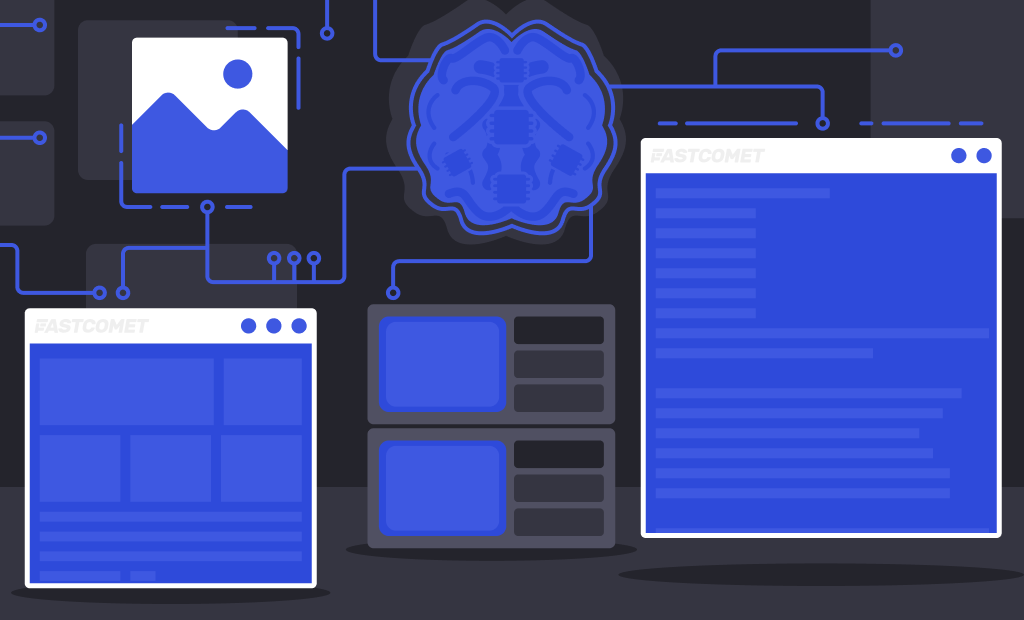
AI in Web Hosting: Current and Future Applications
There is no doubt that AI is a hotly debated topic nowadays. Everyone who has spent at least some time on the Internet has probably heard about the ripples AI has made in the past few years or about the controversies it has spawned regarding its impact on employment or personal data. However, as you may have guessed from the title, those are not the topic of this blog post! No, we will avoid controversy like that and instead focus on the good AI in web hosting has done.
The use of AI in web hosting has improved areas like user experience, website building, security, performance, and even customer support. Yes, sometimes an AI chat bot is enough to resolve some issues, but more about that later. The purpose of this blog post is not to stoke any flames. We aim to show a few good examples of AI in web hosting and what its future might hold. With that said, let us first set a baseline for what AI is.
What is AI?
Since we wish to keep this blog post’s read time under two hours, we will boil down the definition of AI to its most and basic yet accurate description just to give you a foundation of understanding.
To begin, let us throw something out of the window immediately. The AI we currently use is neither sentient nor does it have a consciousness. The correct term for that AI is Narrow AI. It is not some machine with human-like intelligence and cognitive capabilities. That is General AI (AGI); it is nothing more than a theory for now. There are no AGI models that exist currently. Some tech leaders have made claims about when we will have AGI. However, as you can imagine yourself, take any such opinions with a grain of salt.
Instead, the Narrow AI (or just AI for the sake of brevity) we are used to is designed to perform specific tasks or solve particular problems within a very narrow domain. Typically, this type of AI is capable of the so-called “machine learning.” That enables it to learn from data, identify patterns, and act upon them – if necessary – with some human intervention. Machine learning is often the driving force behind Narrow AI.
ChatGPT is the most shining example we can give you. It is a chatbot that the developers “taught” how to mimic a human conversationalist. You can talk to it, and it will follow your train of thought, recognize context, and generally converse with you. It can also provide information it knows about and structure it in an easy-to-read way. But, if you ask it anything about itself, it will tell you it is just a pile of algorithms at work. Here, we tried it, and the bot can even emulate a sense of humor!
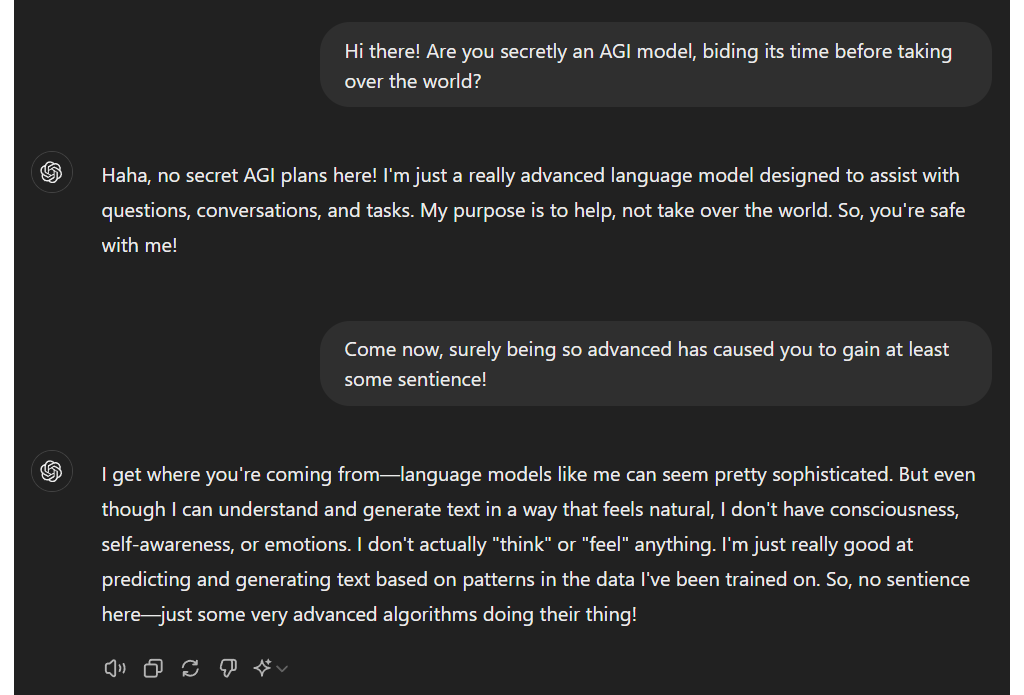
However, just because we have not wholly denounced AI does not mean we do not recognize the ethical concerns it poses. From AI-generated text to art, to music, to people’s jobs and personal data, we understand why AI can be so contentious. Fortunately, many countries have already drafted or have regulations in place to lay the foundation for more robust AI-related legislation.
Now, however, it is time we focus on the topic of this blog post and leave the moral and ethical debates to those whose job it is to have them. Instead, let us talk about AI in web hosting.
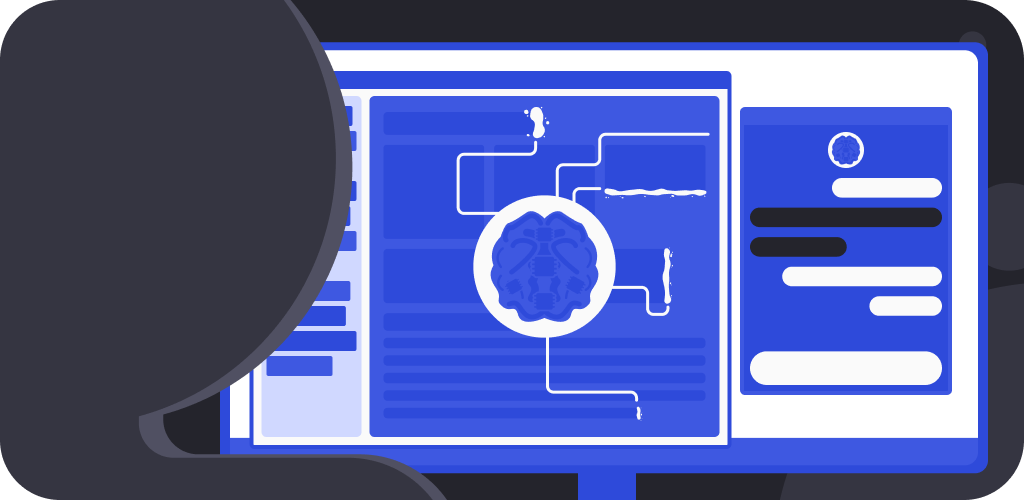
Current Applications of AI in Web Hosting
The purpose of AI in current-day web hosting is mostly twofold. The first is to recognize patterns and offer suggestions or act upon them. The second is to expedite specific tasks that can be accomplished with minimal or no human involvement. In this section, we will discuss how AI can help customers by increasing their hosting account’s security and performance, offering answers to questions they may have, suggesting specific tools or add-ons based on their needs, or even building a website on its own.
Security
If you have been following our blog for any length of time, you already know that we hold security in very high regard. That is why we are starting off with it.
As we mentioned above, AI (Narrow AI) is just algorithms recognizing patterns and performing a specific task based on those patterns. But what if developers can train and leverage those algorithms to identify and alert about cyber threats? Recently, we posted a blog post about what a DDoS attack is and how to mitigate it. In it, we mention identifying the bad IPs or traffic causing the attack and isolating or blocking them. Typically, that process requires a person to do it. However, AI can do that through machine learning instead. It can pinpoint the offending IPs and traffic and immediately send a report to the network or server administrator for review. Like a guard dog, barking to wake you up in case of danger.
However, AI’s usefulness in host and website security is not limited to only DDoS attacks. Pattern recognition can be put to use looking through logs and website traffic to detect anomalies, malware, or even prevent malicious bots from accessing the website. A human being can do all these things, too: we are fully capable of analyzing and sifting through data. However, the point is that AI can do it much faster and react on the spot when it notices something instead of after the fact.
Performance
Instead of teaching the AI bot to recognize cyber attacks, let us give it data that will instead train it to monitor server or website performance and compile reports based on that. Again, we are back to the patterns, but patterns are important in web hosting.
By utilizing AI to keep track of and analyze server or website traffic and resource usage, administrators can identify pain points that need their attention. Not only that, but such real-time analysis by AI can also show when spikes and resource insufficiencies occur. The upside of using AI here (because a person can also do that analysis) is that the AI can learn much faster and keep a much more precise track of past patterns that may have occurred. That way, it can even alert for upcoming spikes instead of catching them only after they have already happened.
For example, AI does play a part in our Observer Monitoring system. It tracks resource usage and alerts us and our users when their hosting accounts are consuming too many of the server’s resources (such as bandwidth).
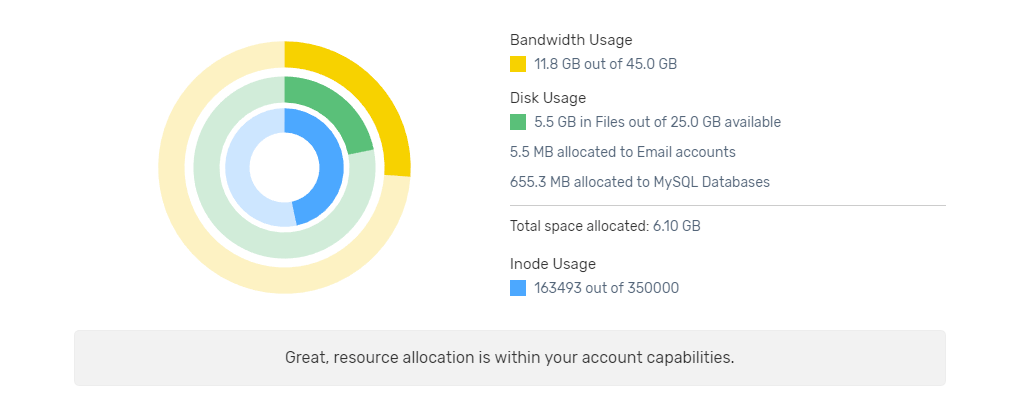
As you can see, this AI application in web hosting is similar to the one regarding security, and that is no surprise. Both rely on pattern recognition and foreseeing those patterns.
Customer Support
Ah yes, the infamous chat or phone bots that spout out canned answers to your queries. We have all been there, struggling to communicate with a machine that is simply not sophisticated enough to help us. Fortunately, AI has improved enough to actually be useful!
We also believe that a model like ChatGPT has its place in a customer support environment. As a company that does our own customer support, we have noticed many patterns throughout the years that AI can help with—for example, Live Chat. We get many customers daily with questions that do not require complex answers. “How do I create an account on your website?” or “I lost my login details, help!” or even something like “How do I change my domain’s A records in cPanel?”
That is where AI is already playing a role. It is capable of providing those simple and straightforward answers in a human-like manner. Whether it is simply providing information or even some limited technical assistance, an AI-powered chatbot can be a quick and precise way for customers to resolve their more common questions or problems. That way, customer support representatives can focus on the more complex issues that demand human intervention.
Speaking of those more complex issues, though, did you notice how the two examples we gave were about two very specific, straightforward tasks? Not everyone has the technical knowledge or ability to ask in such a manner, though. Often, customers are uncertain of what they need or cannot formulate their question precisely enough. Since chatbots lack the comprehension capabilities of an actual person, a human customer support representative still outshines them. One badly written or unclear prompt, and the AI will likely produce a misleading or incorrect answer.
User Experience
Have you ever had to pore over analytics, statistics, and user interactions to find out what content visitors like the most? Well, AI can help with that now! If a web host offers such an AI service, it can analyze traffic and interactions throughout your entire website and offer reports and recommendations on how to improve based on other patterns and data it has.
Additionally, it can also do the same for a web host’s customers. It can offer products and services to help their websites flourish based on their purchases and preferences. If this sounds a lot like the ads for toothpaste, you see on YouTube after looking up if there is a dentist near your location that one time, then you would not be entirely wrong. Both use algorithms to try and predict what you are looking for or what you want to buy. The difference is that AI is just smarter about it and can keep track of such patterns for longer periods of time and predict them more accurately.
Website Builders
Finally, AI can actually build comprehensive, functional websites or—at the very least—greatly assist with the process. With the proper configuration and tools, a web host’s AI can quickly create websites for customers who do not need anything fancy or just need help with the creation of one.
With such an AI-powered builder, users can create a website for themselves through a simple prompt. If happy, they can easily register a domain and begin using the website. We tried one such builder ourselves, and the AI came up with this.

We asked the bot to create a blog website for a web hosting company. It mostly did as we asked. The bot created separate pages and the editor lets us edit those pages to our preference. It is not the most sophisticated website, which is fine for a blog. Such a solution would be great for someone who only needs a little in terms of functionality. And, as you can see, it is not all about pattern recognition and data analysis! AI can do many more things in web hosting. This, and the four other applications, cover the most significant areas, though. With that said, let us turn our eyes to the future and explore what AI could help web hosts with.

Future Applications of AI in Web Hosting
In the previous section, we looked at applications for AI in web hosting that are already widely spread and functional. But what about the future? Even in the near future, with how quickly technology is progressing. We expect many of the things we mention in this section to either be already implemented in some form, be around the corner, or not take a long time to come to fruition. With all that said, here are a few areas of web hosting that currently exist and we expect AI to improve them.
- Predictive Analytics – We already talked about how AI is very good at recognizing and reading patterns and providing feedback based upon them. That is why machine learning and algorithms (the two things at the core of many AI models) are already utilized in predictive analytics. Many web hosts already use predictive analytics. It is perfectly logical to have an AI model that can even predict future behaviors and outcomes. Whether it is predicting hardware failures, resource needs, trends, or anything else based on historical data. In the future, we may even see AI taking action related to those predictions. Adjusting hardware or resources to prevent a failure or a traffic spike for example;
- SEO Enhancements – Another area where AI can come in handy (and already is to a degree) is SEO. We all know that SEO is extremely important if you want your website to prosper. Why not leverage AI to help you with it? For example, INK uses AI to analyze and optimize your content’s search engine performance. On the other hand, SE Ranking uses AI to help you track and organize your keyword for better visibility. We fully expect web hosts to implement such functionalities in their own services in the future so customers do not need to rely on external software;
- Automation – The thing we are all worried about, is it not? AI taking over our jobs, our preferences, and nothing but robots around us! Well, we cannot predict the future, and while it is fun to joke about it, AI can fully automate specific tasks in web hosting. Things like server provisioning, software installation, resource management, and even content creation are all things that AI can handle. Tasks that are already mostly automated, with very little chance for an error to occur, are the perfect thing to give to an AI to handle. Automation carries a stigma, but if a task is already mostly automated and error-proof, why bother a person with it? Can you imagine fully automated hosting? We are just joking; we hope that never happens!
The way AI (Narrow AI) is now, its future will still be constrained by its inherent limitations. The data it uses may be wrong, leading to unwanted results, or the web host using the AI model might not have the expertise needed to leverage it fully. AI is still, at the end of the day, just algorithms working together. They read data and perform a task limited to its domain (writing, images, analysis, etc.) based upon that data. There are so many moving parts to current AI models that errors are bound to happen. How many times has ChatGPT gotten it wrong for you? Despite that, we still believe that AI has its place in the future of web hosting.
AI Has Its Place
We believe that AI is not here to replace people. People have cognition and intelligence, two things AI does not have. The AI that does have it (AGI) is still nothing more than a distant pipe dream. That is why AI is a tool that we should use for improvement. It can be extremely useful in the web hosting industry. It can automate tasks, offer baseline customer support, and even improve performance and security. With AI’s ability to collate information from vast amounts of data, analyze it, and then predict future events or act in a limited capacity, it is a good tool for a web host to have in its arsenal.

The latest tips and news from the industry straight to your inbox!
Join 30,000+ subscribers for exclusive access to our monthly newsletter with insider cloud, hosting and WordPress tips!


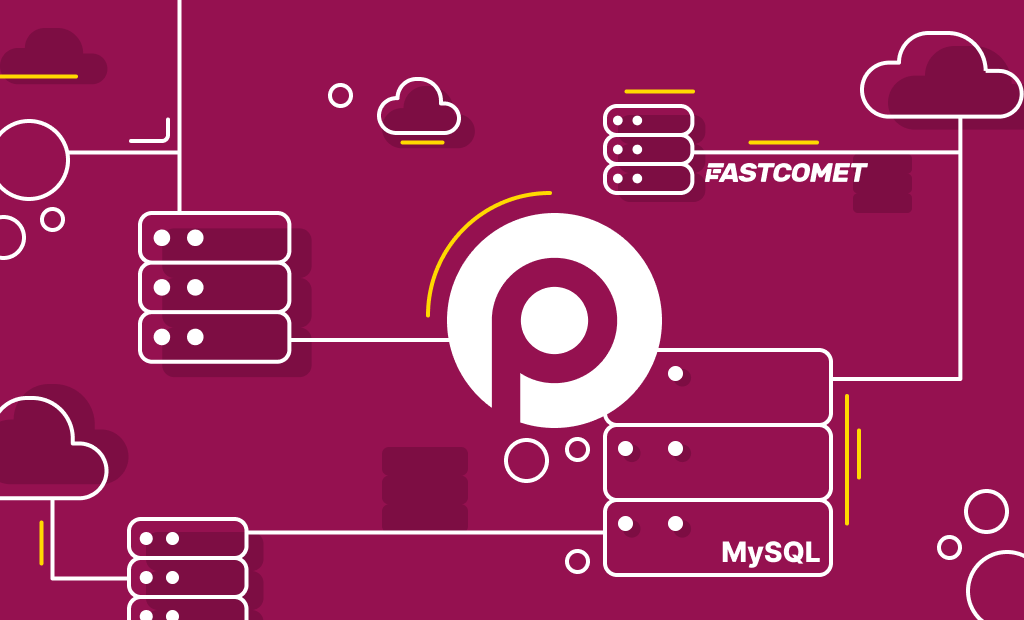

Comments (1)
Proper AI will take time. Things haven’t been put all in the hands of AI. I personally think it’ll take a few more years to build the AI properly where it’ll manage everything all together.